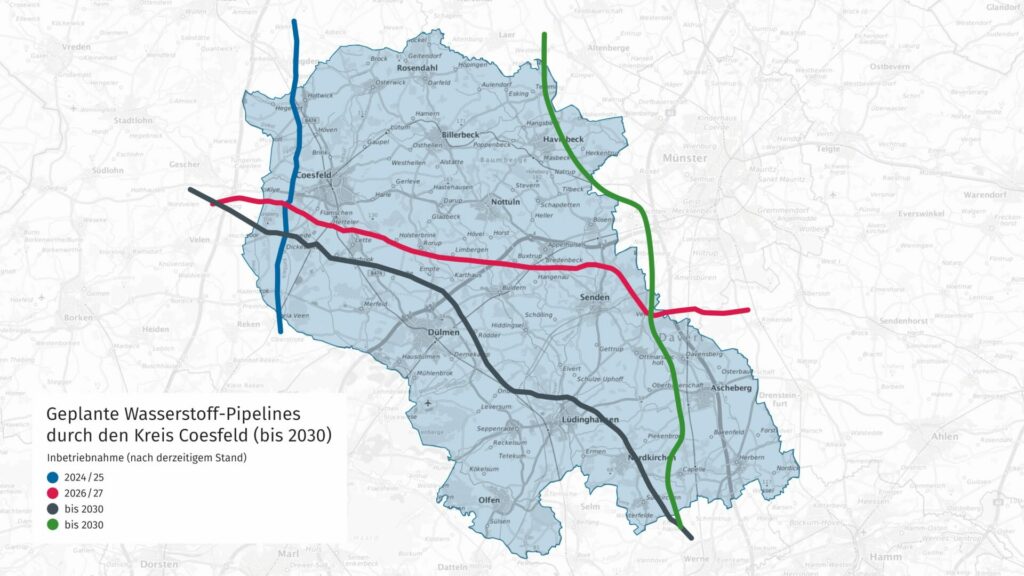Hydrogen as an alternative to fossil fuels
We create the conditions for you to convert your production
Green hydrogen instead of natural gas and coal, petrol and diesel: For sustainable, climate-neutral production, green hydrogen is seen as an important energy source of the future. It can also replace fossil fuels in transport, especially for the transport of people and goods. This is because the use of hydrogen does not produce any climate-damaging emissions.
To enable companies in the district of Coesfeld to convert their production or vehicle fleets to hydrogen or supplement them with hydrogen, the district of Coesfeld, Wirtschaftsbetriebe Kreis Coesfeld (WBC) and wfc Wirtschaftsförderung Kreis Coesfeld are working together with the towns and municipalities on safe and uncomplicated access to the sustainable energy source of the future.
- Coesfeld-Höven biogas upgrading plant/power-to-gas plant
Since 2014, GFC Kreis Coesfeld has been feeding purified biogas of natural gas quality into the Thyssengas natural gas transport network via the biogas upgrading plant at the Coesfeld-Höven landfill site. Based on the feasibility study for a power-to-gas plant for the production of “green” hydrogen, which was successfully completed in 2021, the biogas upgrading plant is now to be supplemented by such a plant. It is expected that up to one million kWh of green hydrogen will be produced annually from 2024 and fed into the natural gas grid in addition to biomethane, meaning that less fossil natural gas will need to be consumed. In order to be able to cover 100 per cent of the energy required to produce the green hydrogen from renewable, regionally produced electricity, the existing ground-mounted PV system at the landfill site is to be expanded to a total output of 1.5 million kWp.
- Hydrogen pipelines
Reducing natural gas consumption by adding green hydrogen is one way of using hydrogen to achieve a more sustainable economy. The other option is to completely replace fossil fuels in production with pure hydrogen as an energy source. Companies will gain access to hydrogen via four hydrogen pipelines, which the transport network operators plan to run through the Coesfeld district in the future, making it possible for everyone in the municipalities to connect. Commissioning is planned between 2024 and 2030.

In order for the companies to be able to access the hydrogen transported in these pipelines, the district administration, commercial enterprises and wfc are negotiating the grid connection points with the operators of these hydrogen pipelines. Downstream distribution networks are being planned to connect commercial areas and larger industrial sites. A survey of companies in the district shows exactly where there is a need and demand and where grid interconnection points and distribution grids are to be installed.
According to a current feasibility study by the district of Coesfeld, a third of the hydrogen required could be produced in the region itself by 2040 thanks to the existing and, by then, further increased number of PV, wind power and biogas plants. The rest will have to be imported. This means that the planned hydrogen pipelines will play a central role in ensuring a secure, sustainable energy supply in the Coesfeld district in the future.
- Hydrogen strategy of the district of Coesfeld
Hydrogen is an important cornerstone in achieving the climate-neutral transformation of the economy in the district of Coesfeld. To ensure that this succeeds and that the activities are not implemented in isolation from each other, but in an integrated manner, we developed a hydrogen strategy for the district of Coesfeld at the beginning of 2024 together with the district administration, the GFC (Gesellschaft des Kreis des Kreises Coesfeld zur Förderung regenerativer Energien) and political representatives. With 18 measures in 6 fields of action, this strategy outlines what is to be tackled in the coming years so that the economy can be reliably supplied with green hydrogen and it is available in particular as an energy source for process energy, mobility (especially heavy goods vehicles) and power-to-power applications.
Link: Hydrogen strategy oft the district of Coesfeld
- Westmünsterland H2 network
In order to familiarise companies with the advantages and possible applications of hydrogen, wfc has set up an H2 network together with the WFG for the Borken district. Here, companies, research organisations and other institutions from Westmünsterland can openly discuss the topic of “hydrogen”. Interesting events and calls for funding are reported on, research results are presented and a platform is created to form potential cooperation partnerships and develop joint project ideas. The meetings take place two to four times a year.
- Joint declaration by local authorities and SMEs in Münsterland and the Emscher-Lippe region on the expansion of the regional hydrogen infrastructure
In order for green hydrogen to become one of the central energy sources of the energy transition, municipalities and SMEs in the Münsterland and Emscher-Lippe region are calling for the National Hydrogen Strategy to focus more intensively on regional distribution infrastructures and the promotion of hydrogen use in energy-intensive industries. To emphasise their demand, they collected around 300 signatures under a joint declaration on the expansion of the regional hydrogen infrastructure at the end of 2022/beginning of 2023 and handed it over to Michael Kellner, State Secretary at the Federal Ministry for Economic Affairs and Climate Protection and Federal Government Commissioner for SMEs.
Further information (also on funding programmes) is available from the Hydrogen Pilot Office of the Federal Ministry for Economic Affairs and Climate Protection https://www.bmwk.de/Navigation/EN/hydrogen/funding-advice.html



























